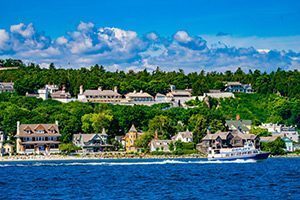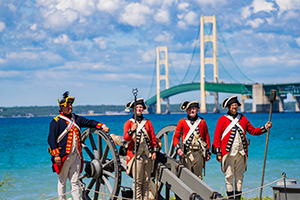
An annual highlight during the late 18th century, King George III’s birthday on June 4 provided British residents of Michilimackinac, as well as the rest of the British empire, an opportunity to celebrate in style. Every year, troops around the world fired special salutes to mark the King’s birth, and civilians and soldiers held parties to toast His Majesty’s health.
The royal birthday celebrations could take many forms, but almost invariably included artillery or musket salutes, combined with other ceremonial elements. In New York City in 1766, Captain John Montressor noted that all of the British officers participated in a procession, accompanied by salutes from warships in the harbor. Oxen were roasted, and beer and grog were served to the civilian population. In the evening, the city was illuminated with candles in every window, and the officers attended a dinner with toasts, each punctuated with more artillery salutes and hearty “huzzas.” Ironically, that year’s royal festivities may have been especially boisterous because the citizens of New York were also celebrating the repeal of the Stamp Act. At Fort Niagara in 1772, the soldiers of the 60th Regiment were under strict orders to be “very Clean well dresst and [their hair] Powdered” when they fired three musket volleys to accompany an artillery salute.
Even the outbreak of the American Revolution did not dampen the annual celebrations. During the summer of 1775, as rebel forces encircled the British in Boston, Lt. John Barker of the 4th Regiment recorded an artillery salute fired from the front lines, followed by another from the Royal Artillery parked on the common, followed by yet another fired from the muskets of the assembled piquet guards. The American rebels attempted to fire their own “salute” a short time later. At Quebec in 1776, Governor Guy Carleton presided over an artillery salute from the city’s citadel, and Baron Friedrich Riedesel, commander of some of the German troops serving with the British in Canada, attended a ball later that evening. A year later, Captain Georg Pausch, a German officer of the Hesse-Hanau Artillery, participated in another royal salute from the Quebec citadel, which was followed by three massed volleys from the British infantrymen of the 29th Regiment. That evening, Pausch’s artillerymen competed against a British Royal Artillery crew in a timed firing test (the Germans won, firing 12 shots in a minute). The civilians of Quebec illuminated the town and staged their own “feu de joie,” firing their muskets and pistols from sunset until well after midnight. In 1778, many of the British and German troops who had celebrated in Quebec found themselves prisoners of war, having surrendered to the Americans at Saratoga in October 1777. Despite these hardships, Baron Riedesel’s wife, Frederika, who accompanied him into captivity, threw a dinner and ball for the British and German officers being held in Massachusetts. In her diary, she reported that “never, I believe, has ‘God save the King’ been sung with more enthusiasm or with more genuine good will.”

Celebrations also took place at remote Michilimackinac, often including artillery salutes. Unfortunately, these birthday firings were twice marred by accidents. In 1771, Captain George Turnbull reported that “The King’s birth day a Matross [artilleryman] lost Two of his fingers by not Spunging the Guns Properly.” Four years later, the King’s birthday turned deadly when, according to Captain Arent DePeyster, “one of my matrosses lost his arm on the King’s birth day I fear thro’ mismanagement, his name is Lindsey.” Lindsey died of his injuries on June 16, 1775.
This year, the King’s birthday will once again be celebrated at Michilimackinac (hopefully in a much safer manner than in 1771 and 1775). Join the interpretive staff at Colonial Michilimackinac on June 4 for artillery salutes, patriotic songs, toasts, and other festivities. Visit www.mackinacparks.com for tickets and more information, and God save the King!









